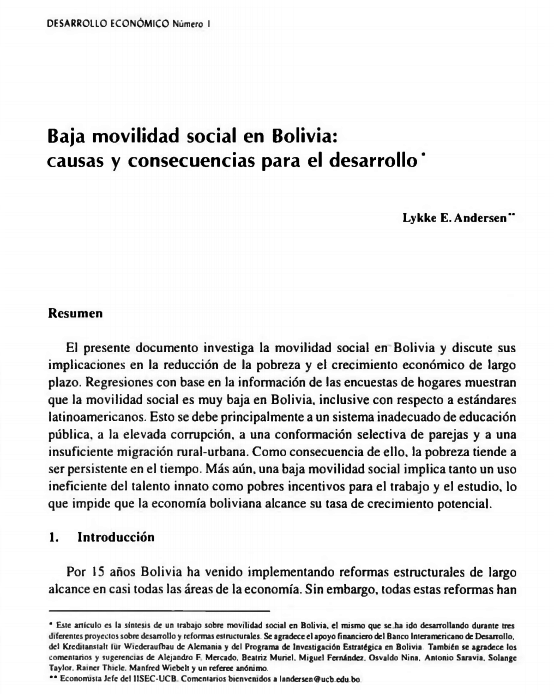Low social mobility in Bolivia: causes and consequences for development
DOI:
https://doi.org/10.35319/lajed.20031338Keywords:
Social mobility, Poverty, Economic growthAbstract
This paper investigates social mobility in Bolivia and discusses its implications for poverty reduction and long-term economic growth. Regressions based on information from household surveys show that social mobility is very low in Bolivia, even respect to Latin American standards. This is mainly due to an inadequate system of public education, high corruption, a selective conformation of couples and an insufficient rural-urban migration. As a consequence, poverty tends to be persistent over time. Moreover, low social mobility implies both an inefficient use of innate talent and poor incentives for work and study, which prevents the Bolivian economy from reaching its potential growth rate.
Downloads
References
Andersen, L.E. 2001. “Social Mobility in Latin America”. Instituto de Investigaciones Sociales y Económicas, Universidad Católica Boliviana. Documento de Trabajo, N° 03/2000.
Baumol, W.J. 1990. “Entrepreneurship: Productive. Unproductive and Destructive”. Journal o f Political Economy. Vol. 98(5): 893-921.
Becker, G.S.1991. A Treatise on the Family. Enlarged Edition. Cambridge, Mass.: Harvard University Press.
Behrman, J.R., N. Birdsall y M. Székely. 1998. “Intergenerational Schooling Mobility and Macro Conditions and Schooling Policies in Latin America”. Inter-American Development Bank. Office of the Chief Economist. Mimeo.
Dahan, M. y A. Gaviria. 2000. “Sibling Correlations and Social Mobility in Latin América”. InterAmerican Development Bank. Office of the Chief Economist. Draft. Marzo.
Fields, G.S. 1996. “Accounting for Differences in Income Inequality”. School of Industrial and Labor Relations. Cornell University. Draft. Enero.
Fundación Pueblo. 2003. “Acceso escolar y la factibilidad del Programa Hospedaje Estudiantil en Familia en el Norte de Potosí”. Informe para GTZ-Programa de Desarrollo Rural. La Paz. Marzo.
Hassler, J. y J.V. Rodríguez Mora. 1998. “IQ, Social Mobility and Growth”. Institute for International Economic Studies, Stockholm University. Seminar Papers N° 635. Enero.
Kremer, M. 1996. “How Much Does Sorting Increase Inequality”. NBER. Working Paper N° 5566, Mayo.
Mood, A.M., F.A. Graybill y D.C. Boes. 1974. Introduction to the Theory o f Statistics. Third Edition. Mc-Graw-Hill.
Moulton, B. 1986. “Random Group Effects and the Precision of Regression Estimates”. Journal of Econometrics. Vol. 32: 385-397.
Murphy, K.M., A. Scheifer y R.W. Vishny. 1991. “The Allocation of Talent: Implications for Growth”. Quarterly Journal o f Economics. Vol 106(2): 503-530.
Nina, O. y M. Rubio. 2001. “Bolivia: desempeño macroeconómico y pobreza”. Inter-American Development Bank. Social Development Department. Mimeo.
Raut, L.K. 1996. “Signalling Equilibrium. IntergenerationalMobility and Long-Run Growth”. University of Hawaii-Manoa. Draft. Febrero.
Székely, M. y M. Hilgert. 1999. “What’s Behind the Inequality We Measure: An Investigation Using Latin American Data for the 1990s”. Research Departmental the Inter-American Development Bank. Draft. Diciembre.
Transparency International 2000. The 2000 Corruption Perception Index. Ver http://www.iransparency.org/.
Urquiola, M. 2000. “Educación Primaria Universal”. En: UNDP. 2000. Remontando la pobreza: ocho cimas a la vez. La Paz: EDOBOL.
Vera, M. 1999. “Efectividad relativa de los colegios privados y fiscales en Bolivia”. Revista de Investigación Económica. Vol. 17. UDAPE, La Paz, Bolivia, Septiembre.
Vos, R., H. Lee y J.A. Mejía. 1997 “Structural Adjustment and Poverty in Bolivia”. Inter-American Development Bank. INDES. Washington D.C. Working Paper N° 1-3.






